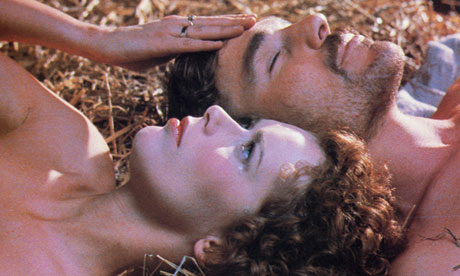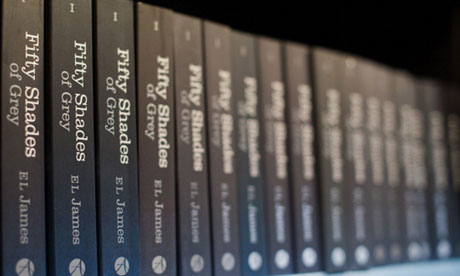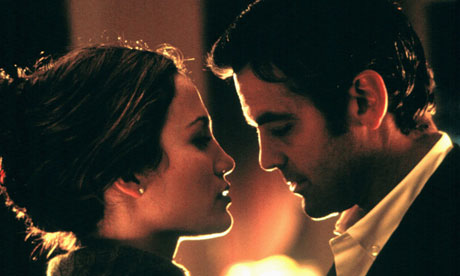
Was it good for you? Sylvia Kristel and
Nicholas Clay in Lady Chatterley's Lover (1981). Photograph: Pictorial Press
Ltd/Alamy
Who wrote this? "He lifted
her on to his hips and staggered around with her mouth locked to his, and then
they were humping fiercely through their clothes, between piles of other
clothes, and then one of those pauses descended, an uneasy recollection of how
universal the ascending steps to sex were; how impersonal,
or pre-personal. He pulled away abruptly, toward the unmade single bed, and
knocked over a pile of books and documents relating to overpopulation."
Here's a clue: they came
second in salon.com's 2011 Good Sex awards. Guessed
yet? Here's how the scene ended. "He began to cry into Lalitha's hair, and she
comforted him, brushed his tears away, and they made love again more tiredly and
painfully, until he did finally come, without fanfare, in her hand." The answer?
Jonathan Franzen, in Freedom.
If Franzen does write well about sex, he does so in part because he allows in
humour (that overpopulation gag; and the idea that a really good orgasm might be
saluted by a horn section) without letting it overwhelm the scene or destroy its
pathos. He also recognises the personality-transcending nature of sex – at least
if, and I don't want to be prescriptive, you're doing it right. And it is this
very universality or impersonality of sex that creates a problem for those
novelists who write about it: in a steamy paragraph of universalisable fatuity,
you risk destroying the characters you have spent the preceding pages
creating.
Julian Barnes, writing
in this week's Radio Times, identifies a specifically British problem about
sex in literature. Ever since the ban on DH Lawrence's Lady
Chatterley's Lover was overturned
in 1960 (when Booker-winning Barnes was 14), what was a blanket prohibition
has been replaced by almost the reverse: "not just a writerly desire, but a
commercial obligation to write in a detailed way about sex". On the one hand, at
least we were catching up with all those mucky foreign writers – Jack Kerouac,
Henry Miller, Pauline Réage and Georges Bataille – who'd been writing about sex
for years without the postmaster general puffing and blowing unerotically in
their collective earhole. But post-Chatterley, there was a problem for newly
liberated BritLit, contends Barnes. "Sometimes all that happened was that the
misleading old euphemisms were replaced by the misleading new cliches." Typical
British: they come too late – and then unedifyingly.
 Must all literary sex, such as that
in Fifty Shades of Grey, be a realistic representation of the author's love
life? Photograph: AFP/Getty Images
Must all literary sex, such as that
in Fifty Shades of Grey, be a realistic representation of the author's love
life? Photograph: AFP/Getty Images
Why is sex so hard to write
well? Perhaps, the most lovely passages of sex in fiction are those that
concern the moments before or immediately after rather than in what highbrow
critics call mid-rumpypumpydom. Consider, for instance, this sweet scene
featuring an elderly couple from Mohsin
Hamid's forthcoming novel How to Get Filthy Rich in Rising Asia: "Neither of
you reaches your finish. You begin to deflate before that moment comes. But, I
should add, you do reach pleasure, and a measure of comfort, and lying there
afterwards, temporarily thwarted and a little embarrassed, you unexpectedly
start to chuckle, and she joins you, and it is the best and warmest laugh either
of you has had in some time."
No doubt Barnes has a point
about commercial obligation. Hence, perhaps, Fifty Shades of
Grey. Proper literary writers, like shy ones at some orgy, are fearful of
such entanglements, or perhaps of ending up in the Bad Sex in Fiction awards
– like Alan Titchmarsh with Mr MacGregor, in which a man having sex with a woman
becomes "entangled in the lissome limbs of this human boa constrictor". There's
a fear, argues Barnes: "that readers may conclude, when you describe a sexual
act, that it must already have happened to you in pretty much the manner
described". Barnes gives the example of Kingsley Amis, whom he says abandoned a
novel in the 1980s because it contained a gay character and he feared "the chaps
at the club might think I was queer".
 Jennifer Lopez and George Clooney
get close in Steven Soderbergh's 1998 film Out of Sight. Photograph:
Allstar/Cinetext/MCA/Universal
Jennifer Lopez and George Clooney
get close in Steven Soderbergh's 1998 film Out of Sight. Photograph:
Allstar/Cinetext/MCA/Universal
No comments:
Post a Comment